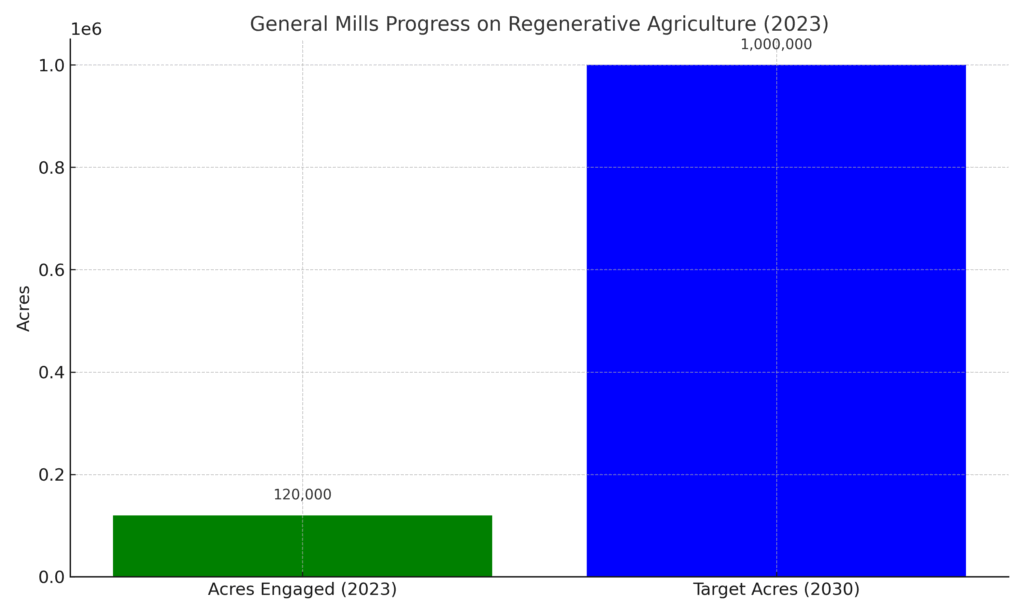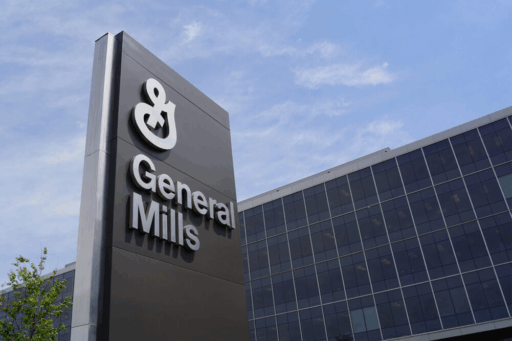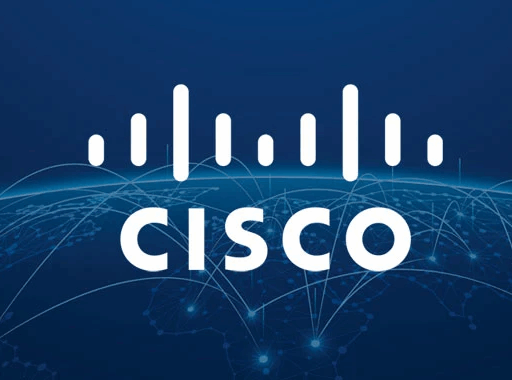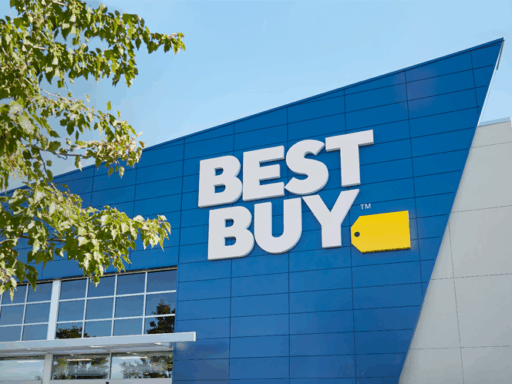General Mills, one of the world’s leading food companies, has long recognized the importance of sustainability in its operations. The company, with iconic brands like Cheerios, Haagen-Dazs, and Nature Valley, has made significant strides in reducing its environmental footprint and driving positive social impact. Its most recent sustainability efforts are anchored in the company’s 2030 goals, which are part of its broader commitment to creating a Better Food, Better Future through initiatives that balance business growth with environmental stewardship and social responsibility.
Sustainability Strategy and Goals
General Mills’ sustainability strategy focuses on three core areas: Climate Action, Regenerative Agriculture, and Sustainable Sourcing. These goals are guided by frameworks such as the UN Sustainable Development Goals (SDGs) and the Science-Based Targets Initiative (SBTi). In line with these commitments, General Mills has set ambitious goals for net-zero greenhouse gas (GHG) emissions by 2050 and is working to drive the transition to a more sustainable food system.
General Mills Sustainability Goals and Targets
| Sustainability Area | Goal | Target Year | Progress/Status |
|---|---|---|---|
| Net Zero and Carbon Emissions | Achieve net-zero GHG emissions across value chain | 2050 | 15% reduction in direct GHG emissions (2010–2020) |
| Water Stewardship | Improve water use efficiency | 2030 | 22% improvement in water efficiency (2018–2022) |
| Regenerative Agriculture | Engage 1 million acres in regenerative agriculture | 2030 | Over 120,000 acres engaged (2023) |
| Packaging Sustainability | 100% recyclable, compostable, or biodegradable packaging | 2030 | 80% recyclable packaging (2023) |
| Hunger Relief | Provide 500 million meals annually | 2030 | On track to meet target |
Net Zero and Carbon Emissions
- General Mills has committed to achieving net-zero emissions across its entire value chain by 2050, aligning with the goals of the Paris Climate Agreement. As part of its plan, the company has already achieved 15% reduction in GHG emissions across its operations from 2010 to 2020 (source: General Mills Sustainability Report 2023).
- The company has also set a target of reducing scope 3 emissions (those that come from its supply chain and beyond its direct operations) by 28% by 2030.
Water Stewardship
General Mills has a significant presence in regions where water scarcity is an issue. The company has pledged to improve its water use efficiency by 20% per unit of production by 2030, a target that contributes to improving its global water stewardship efforts.
- In 2022, General Mills exceeded its water efficiency target by 22% compared to 2018 levels.
Regenerative Agriculture
General Mills is a leader in regenerative agriculture, a farming approach focused on improving soil health, enhancing biodiversity, and sequestering carbon. The company aims to support the adoption of regenerative farming practices across 1 million acres of farmland by 2030.
- The company has already made significant progress, with over 120,000 acres of farmland engaged in regenerative agriculture practices as of 2023. These practices contribute to both environmental benefits and resilience in farming communities.
Deforestation and Biodiversity
General Mills is committed to no deforestation across its key agricultural supply chains by 2025, with a particular focus on palm oil, soy, and paper products. The company works with organizations like the Roundtable on Sustainable Palm Oil (RSPO) to ensure its palm oil is sustainably sourced.
- Through these efforts, General Mills has helped protect biodiversity by mitigating the impact of agricultural expansion in sensitive areas like rainforests.
Packaging and Circular Economy
Packaging waste is one of the most significant contributors to pollution, and General Mills is actively addressing this by working toward 100% recyclable, compostable, or biodegradable packaging by 2030.
- The company has already made substantial progress, with 80% of its packaging now recyclable or reusable.
- Additionally, General Mills is exploring the use of post-consumer recycled content in packaging, further minimizing the need for virgin materials.
Human Rights and Responsible Sourcing
General Mills is committed to responsible sourcing, ensuring that human rights and fair labor practices are upheld across its supply chain. The company enforces strict standards through its Supplier Code of Conduct, ensuring that its suppliers respect workers’ rights, health, and safety.
- General Mills has also launched initiatives to enhance the diversity and inclusion of its suppliers, encouraging greater participation from minority- and women-owned businesses.
Nutrition and Health
General Mills has made significant strides in improving the nutritional quality of its products. This includes:
- Reducing added sugar in its products by 30% since 2015.
- Expanding its portfolio of plant-based products, which now includes several options that contribute to a healthier, more sustainable diet.
Community and Social Impact
General Mills has a long history of supporting global hunger relief efforts, with a particular focus on donating food to communities in need. The company has committed to providing 500 million meals annually through its hunger relief initiatives by 2030.
- It also supports sustainable farming and education initiatives, especially in underserved regions.
Governance and Transparency
Governance is a core element of General Mills’ sustainability strategy. The company has implemented clear governance structures to oversee its sustainability goals, ensuring accountability and transparency. This includes regular sustainability disclosures and engagement with stakeholders to drive continual improvement.
Technology and Innovation
General Mills is investing in technology to support its sustainability goals. The company is exploring AI-driven technologies and data analytics to optimize supply chains and improve sustainability outcomes. These innovations help General Mills reduce waste, improve energy efficiency, and enhance sustainability across its operations.
Key Sustainability Innovations and Technologies
General Mills has embraced several key technologies to enhance its sustainability efforts:
- AI and Data Analytics: The company uses advanced technology to monitor and reduce energy consumption, water use, and waste across its facilities.
- Regenerative Agricultural Innovations: General Mills partners with farmers to implement cutting-edge technologies like soil carbon measurement tools to track and optimize soil health.
- Blockchain for Transparency: General Mills is exploring the use of blockchain to track the journey of ingredients from farm to table, providing transparency around sourcing and sustainability.
General Mills Progress on Regenerative Agriculture (2023)

Measurable Impacts
General Mills has made significant progress on its sustainability commitments, including:
- Water use reduction: 22% improvement in water efficiency compared to 2018 levels.
- Carbon emissions: A 15% reduction in direct GHG emissions from 2010 to 2020, with a commitment to achieving net-zero emissions by 2050.
- Sustainable packaging: 80% recyclable packaging across its portfolio.
- Regenerative agriculture: Engaging 120,000 acres of farmland in regenerative practices by 2023, on track to reach 1 million acres by 2030.
Challenges and Areas for Improvement
While General Mills has made significant strides, there are areas where challenges remain:
- Scope 3 emissions: Reducing emissions across the supply chain, particularly in agriculture and transportation, remains a major challenge. These emissions account for a significant portion of General Mills’ carbon footprint, and efforts to reduce them are ongoing.
- Packaging waste: Despite progress, achieving 100% sustainable packaging by 2030 will require overcoming challenges related to the use of materials, waste management, and consumer behavior.
- Regenerative Agriculture Scaling: Expanding regenerative practices to a larger scale requires investment in farmer education, tools, and access to markets, especially in developing countries.
Future Plans and Long-Term Goals
General Mills is committed to making bold progress in the coming years:
- Sustainable Agriculture: Expanding regenerative agriculture across 1 million acres by 2030, improving soil health, and increasing carbon sequestration.
- Zero-Waste Manufacturing: Achieving zero waste to landfill at all its global manufacturing facilities by 2030.
- Circular Packaging: Transitioning to 100% recyclable, compostable, or biodegradable packaging by 2030.
Comparisons to Industry Competitors
General Mills compares favorably to its peers in the food industry when it comes to sustainability. Compared to Nestlé, which has set a target of zero net emissions by 2050 and has already made substantial investments in sustainable sourcing, General Mills stands out with its specific commitments to regenerative agriculture and the use of AI in sustainability efforts. However, both companies face similar challenges in reducing Scope 3 emissions.
Other companies like Danone have made notable progress in biodiversity protection and water stewardship, with similar goals aligned with General Mills’ targets. However, General Mills’ packaging innovations and commitment to hunger relief give it a competitive edge in certain areas.
Our Thoughts
General Mills has demonstrated strong leadership in sustainability with a comprehensive, well-structured approach that addresses key environmental and social challenges. The company’s commitment to regenerative agriculture and net-zero emissions is particularly commendable, and its progress toward sustainable packaging and water stewardship provides a solid foundation for continued improvement. While there are challenges in scaling certain initiatives, particularly around Scope 3 emissions, General Mills’ forward-thinking strategies and ambitious 2030 targets position it well to meet its sustainability goals and further differentiate itself in a rapidly evolving market.
For other companies in the food industry, General Mills offers a valuable blueprint for integrating sustainability into every facet of the business, from sourcing to packaging to community impact.
Sources
General Mills Sustainability Report 2023, “Sustainability Progress and Strategy”, https://www.generalmills.com/sustainability
Grand View Research, “Global Sustainable Packaging Market Size & Share Report, 2023”, https://www.grandviewresearch.com/industry-analysis/sustainable-packaging-market
Science Based Targets Initiative (SBTi), “Science-Based Targets: The Road to Net-Zero”, https://sciencebasedtargets.org
United Nations Sustainable Development Goals, “Goal 12: Responsible Consumption and Production”, https://sdgs.un.org/goals/goal12
Environmental Protection Agency, “Climate Change and Agriculture”, https://www.epa.gov/climate-change/agriculture
Environmental Working Group, “General Mills’ Role in Sustainable Sourcing”, https://www.ewg.org






